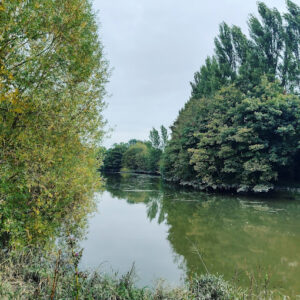The river at Aylesford Priory
Following a shocking sexual assault at the age of 10 from a stranger, John Cornwell, author of Seminary Boy, describes how the church teaching on ‘the Evil One’ as he who ‘wanders through the world for the ruin of souls’ began to give him a language to help him find some way to make sense of the abusive experience. The words filled Cornwell with dread, especially at night, but by serving at Mass and becoming an altar boy, he found that the rituals and rhythm of the service gave him an unexpected sense of satisfaction and helped him.
‘The murmured words of the Latin echoing to the church rafters, the bell chimes, the devout movements by candlelight in the cool of dawn filled me with wonder. Lighting candles before the statue of the Virgin, reverently making the sign of the Cross with Holy Water on entering and leaving church, carrying rosary beads on my persona at all times, genuflecting with reverence, crossing my forehead, lips and heart in the correct manner at the Gospel, calmed and soothed me.’
Here is the sense of ‘other’ and mystery that children can respond to – nothing about morals or behaviour, but something altogether different. As he became increasingly attached to the church, Cornwell as an adult, could see that looking back there was an element of narcissism and self-importance in his adoption of his position as ‘an angelic child surrounded with sacred light; a glowing little saint’. This he felt gave him what he calls ‘holy power’ over the rest of his family as he basked in his mother’s approval. It also consciously or unconsciously gave him a sense of being protected against dark forces.
When a group of sixty boys from ‘poor’ families were taken from the East End for a summer camp near Aylesford priory in Kent, Cornwell’s attachment deepened further:
‘I watched the brown-and-white-robed friars singing in their renovated church, and walking prayerfully among the cloisters. I was enraptured by the view of weeping willows through clear Gothic windows, the dawn chorus, the tolling of bells marking out the monastic day, river waters lapping below ragstone walls, the smell of baking bread in the kitchens. Aylesford was a haven from the degrading everyday realities of parental discord, the school at Ilford, and dangerous men who lurk near toilets in South Kensington.’
The monks singing resonated deeply for Cornwell, and he felt what he calls ‘an inclining’ of his heart and soul ‘like the opening of a flower in warm sunlight.’ The whole experience of nature deepened his sense of transformation after the suburbs of London, with the scent of the river plus the incense, and the swooping of the house martins filling him with happiness.
After leaving the seminary where he went from the age of 13, and with all the mixed experiences and events that happened there, Cornwell had many years absence from the church. He eventually returned, seeing that what he had escaped was not God at all, as he had originally thought, but rather the false representations of God. Religion had saved him as a boy from serious difficulties, but as we all do, he needed to find an authentic faith later in adulthood.
